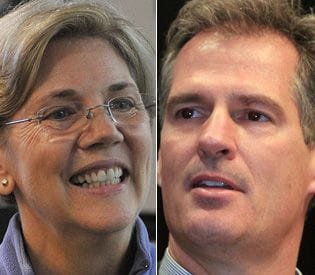Massachusetts Senate Race to Be Decided by Independent Voters


The Massachusetts Senate race is quickly heating up, with 2-year incumbent Republican Scott Brown (winner of a special election to fill Ted Kennedy’s seat in 2010) neck-and-neck in the polls with presumed Democratic nominee and liberal icon, Elizabeth Warren. The seat, long-held by Democrats, is an important one to the Democratic establishment, and thus wallets on both sides are opening wide, giving this race a chance at being the most expensive ever.
Most significant, however, is Massachusetts’s voter demographics: more than half the state’s voters are registered independents. With Warren a dream-candidate for the States’ liberals, and Brown conservative enough for most establishment Republicans, the race has become a brawl for the independent vote.
Brown’s surprise win in 2010 came on the shoulders of independent voters, and his campaign is attempting to make that happen again. Brown’s TV ads quote Leslie Stahl’s 60 minutes feature on him: “He’s turned out to be fiercely independent, and beholden to no one.” In his own words, at his campaign kickoff in January, Brown said:
"Once again I won’t have the political establishment behind me – not the one on Beacon Hill, and certainly not the one on Capitol Hill. All I will have going for me is my independent record as your United States Senator, and the independent spirit of the Massachusetts voter. I’ll take those advantages any day over the political machine, and with your help in this campaign we will beat the odds again together."
Yet, despite Brown’s self-applied label of independence, he has received the maximum legal backing possible from the National Republican Senatorial Campaign as well as large monetary donations from the PACs associated with some of the top Republican leadership in the Senate (including Mitt Romney, Mitch McConnell, and Jon Kyl). While there is no denying that Brown voted across the aisle more frequently than most other Republican senators, he still voted with Republican partisanship 76% of the time. Moreover, Brown voted with his party 93% of the time before Warren entered the race.
Meanwhile, Warren has been doing her part to appeal to independents as well. For the most part, it has been working. As Public Policy Polling puts it, “Republicans love [Brown], giving him an 80/7 approval spread. But his appeal to Democrats and independents is not what it once was.” Going further, PPP writes “Warren is reclaiming the middle from Brown. We find her up 42-40 with moderate voters, a group that we found Brown leading Coakley 55-41 with.”
Warren, born to lower-middle class parents and now a Harvard professor, is known for her economic expertise and advocacy for accountability on Wall Street. She is the inventor of and special adviser to the Consumer Financial Protection Bureau. Warren is a dream candidate for many liberals looking for more regulation on major banks.
While Warren has not directly labeled herself independent, her rhetoric shows she is appealing to moderate voters: she stands for reforming Washington and advocating for working class families. As she says on her website:
"I’ve seen the thundering herds of lobbyists fill the halls of Congress first-hand, and I can tell you that Washington works for them and the big corporations and banks they represent, but too often it doesn’t work for middle class families. That’s got to change."
The Massachusetts senate race reflects the increasing influence of independent voters in this country. Unfortunately, it is yet another example of devoted members of either party spinning their diction and tweaking their ads to capture independent votes and get into office. Though independents are gaining traction, they still represent a demographic group that candidates from either party try to use to their advantage to get elected.
Instead, independents should be a diverse and varied core of opinions and ideologies that look to reform a broken Washington. Each independent should be a vote for something different than a typical Republican or a Democrat, not a vote that can go either Republican or Democrat. If either Scott Brown or Elizabeth Warren start to grasp this, their campaign is sure to see a bump in the polls.



